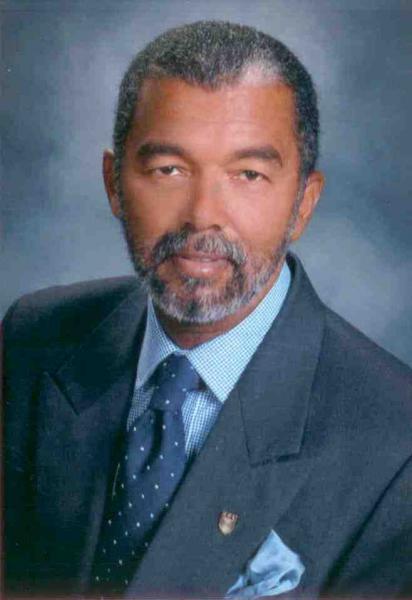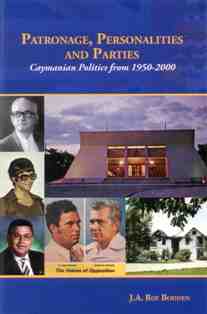 (CNS): The story of Cayman’s political personalities since the 1950s has now been revealed in the latest academic book by the UCCI president and former education minster, Roy Bodden. Following the 2007 publication of The Cayman Islands in Transition: The Politics, History, and Sociology of a Changing Society, Bodden’s second installment in a planned trilogy, Patronage, Personalities and Parties: Caymanian Politics from 1950-2000, is now on the local bookshelves. The former politician and long time academic will be presenting his latest work at special signing at Books & Books next Friday.
(CNS): The story of Cayman’s political personalities since the 1950s has now been revealed in the latest academic book by the UCCI president and former education minster, Roy Bodden. Following the 2007 publication of The Cayman Islands in Transition: The Politics, History, and Sociology of a Changing Society, Bodden’s second installment in a planned trilogy, Patronage, Personalities and Parties: Caymanian Politics from 1950-2000, is now on the local bookshelves. The former politician and long time academic will be presenting his latest work at special signing at Books & Books next Friday.
The book, which forms part of a volume of work outlining the country’s social and political history, charts the evolution of the Caymanian political landscape from the 1950s to the present.
Three main features stand out: a system of patronage based on the nexus of power, influence and money in which a white and near white oligarchy controlled the economy, its politics and the society; the emergence at various times of strong personalities who established hegemonic incumbencies and controlled political power through ‘teams’ rather than political parties; and a rigid adherence to the status of ‘voluntary colonialism’ in which political leaders, the merchant elite and the society at large, continue to opt for a relationship with Britain rather than seek political self-determination.

Bodden provides an historical and interpretive analysis of the political development of Cayman from the time the country received its first written constitution, through the turbulent decades of the 1980s and 1990s to the modern era.
The account of these years is dominated by outstanding personalities like Ormond Panton, whose attempts to arouse political consciousness among Caymanians through the formation of the National Democratic Party (NDP) were undermined by local political elements and the colonial power; Jim Bodden, who for many years bestrode the Caymanian political scene like a colossus; and McKeeva Bush, who, in the words of Bodden, “has brought a 21st century approach to Caymanian politics.”
Bodden introduces a number of organizing concepts to aid our understanding of crucial aspects of Caymanian politics; the ‘reptilian agenda’ of Jim and Haig Bodden is used to explain their tactics as opposition politicians; similarly their ‘hegemonic incumbencies’ highlight for the reader how they and other politicians were able to establish and maintain rigid control over their constituencies, sometimes for decades; and finally ‘voluntary colonialism’ to explain why generations of economically independent Caymanians continue to opt for control by a colonial power in preference to their own political independence.
Bodden’s first volume, The Cayman Islands in Transition: The Politics, History, and Sociology of a Changing Society, set the standard for modern scholarship in the Cayman Islands.
In his new book, he combines the dispassionate approach of the professional historian with the insight and authenticity of one who was an active participant in the processes and events described in the book. Even more so than the first volume, this new work is bound to provoke debate, discourse, argument, criticism and scholarship, both within and outside the Cayman Islands.
Bodden is President of the University College of the Cayman Islands. He is a former member of the Legislative Assembly (MLA) of the Cayman Islands and served as minister of education, human Rresources and culture from 2000 to 2005. He is currently working on the third volume, provisionally entitled Family, Wealth, Class, Status and the Political Economy of Land in the Cayman Islands.
The Cayman Islands in Transition: The Politics, History, and Sociology of a Changing Society and Patronage, Personalities and Parties: Caymanian Politics from 1950-2000 are now available at Books & Books. This event is free and open to the public at 7pm on Friday 30 July.
 (CNS): The story of Cayman’s political personalities since the 1950s has now been revealed in the latest academic book by the UCCI president and former education minster, Roy Bodden. Following the 2007 publication of The Cayman Islands in Transition: The Politics, History, and Sociology of a Changing Society, Bodden’s second installment in a planned trilogy, Patronage, Personalities and Parties: Caymanian Politics from 1950-2000, is now on the local bookshelves. The former politician and long time academic will be presenting his latest work at special signing at Books & Books next Friday.
(CNS): The story of Cayman’s political personalities since the 1950s has now been revealed in the latest academic book by the UCCI president and former education minster, Roy Bodden. Following the 2007 publication of The Cayman Islands in Transition: The Politics, History, and Sociology of a Changing Society, Bodden’s second installment in a planned trilogy, Patronage, Personalities and Parties: Caymanian Politics from 1950-2000, is now on the local bookshelves. The former politician and long time academic will be presenting his latest work at special signing at Books & Books next Friday.


Roy’s book, like the last one, is very readable (despite awful repetition, very poor editing leading to spelling and grammar errors, even in quoted materials) and is important because to give him credit he is writing about Cayman as he sees it. But it is rather depressing in his determination to keep on (begun in the last book) settling scores with Truman and the "white or near white elite" 40 years after Truman stupidly belittled him for so called black power views after Roy came back from university. I would like to hear a lot of debate on his views from the likes of Frank and Steve. Roy’s fierce anger in this book is amazing; do they as highly intelligent black men share it?
One major flaw of the book is that it is not-repeat not – objective/unbiased in even the slightest way. It is an opinionated score settler on behalf of himself and other black people and he should have made that clear; people would still have found it very interesting and informative.
Man you can’t get rich trying to sell a book in Cayman! We don’t have a million people here! Although it seems that way sometimes!
I attended his book opening at UCCI and so did the Premier amongst other respected guest I must tell you the security arrangements at this function was robust almost like US secret service & blackwater type of security and very low key the RCIPs could take some lesson or two from these guys. The UCCI facility in general gave you a sense of security and safety. I guest our premier requires that level nowadays
He must have upset the whole nation if he needs that much security. D they really ate him that much? My god!
You had my attention Mr. Bodden until the last sentence of the 5th paragraph. Surely you misspoke when you say that McKeewa has brought a 21st century approach to Caymanian politics!!!!! I would say that it is more comparable to Lenin in the early 20th century!!!
Sorry but I wont be buying any of your books if this is how you feel about the worst politician and leader in the history of Cayman!!!! Good luck with sales.
Despite McKeeva being a bad person, credit to whom credit is due, my friend. This has nothing to do with being on UDP or PPM side.
It has always been my contention that the rapid evolution to Cayman’s development was brought about in part by money of dubious origin that was brought to the Cayman Islands before the strict banking rules were put in place.
Those individuals behind the investment at that time kept an eye and a place within the country to safeguard their large holdings here.
Some prominent business may have received an infusion of capital at that time as well. Given the veil of secrecy in Cayman it is likely that any details of such relationships will never be known.
If I were to place such large holding in a foreign country you can be sure that I would make it my business to safeguard said investment, it is only common sense.
Before anyone gets bent this is only conjecture.
Boi, I better not my book on current political personalities… it doesn’t make pleasant reading at all, at all…
I
Writing political books and thesis in favor of unpopular governments or leadership is a derailment of book sales, in my opinion. Can’t get rich like that. You may break even. I still wish Mr. Bodden well.
He is not trying 2 get RICH you FOOOL he is trying to EDUCATE!!!
Well excuse me for using the term, but there are 3 reasons people write books;
1 To educate
2 To Make money
3. To pollute
I don’t think Mr. Bodden intends to pollute our society nor any other, but most certainly he wants to make money, he would be foolish if he didn’t . Most Authors do write books a lot of them, to get rich and they do!
No one is saying he is money hungry, my comment was just somewhat of a hyperbole.
Where’s your sense of humor?